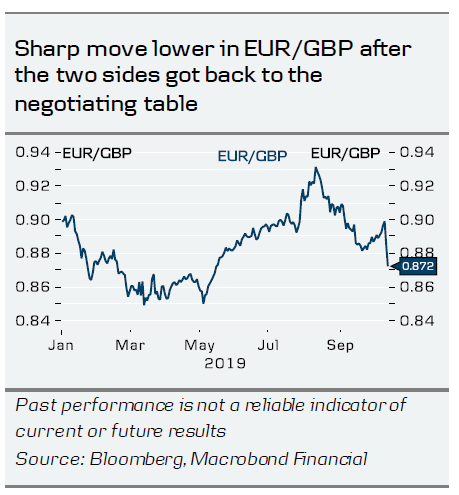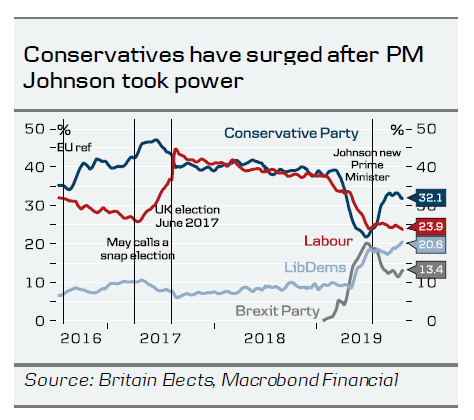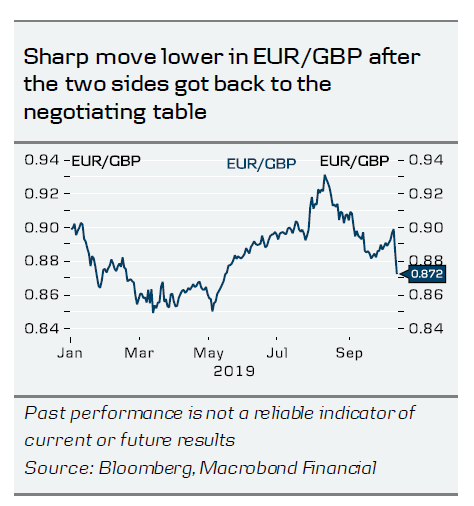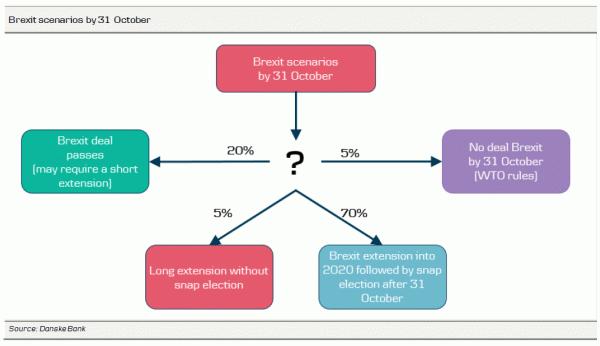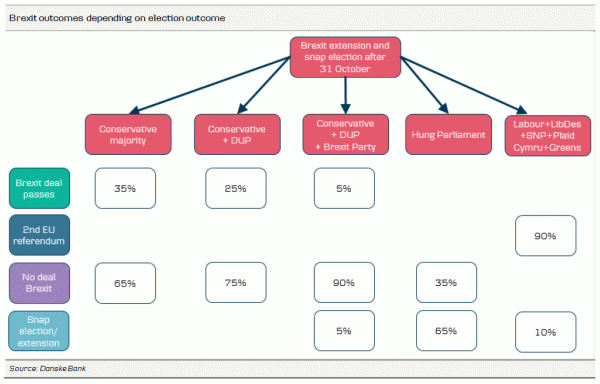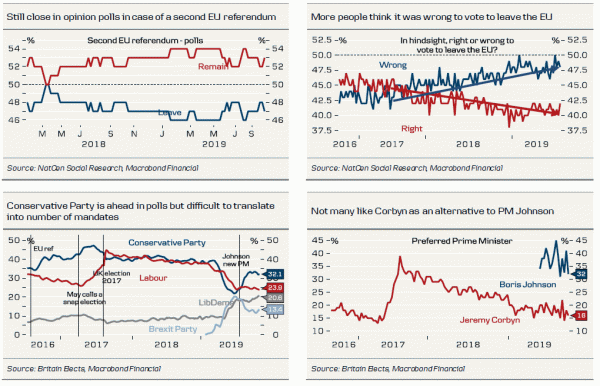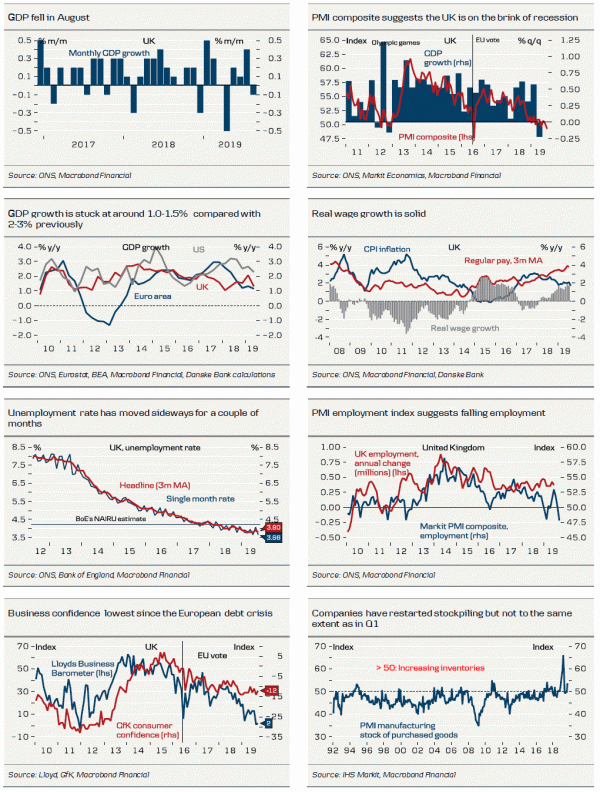Key takeaways
- We have increased the probability of a deal to 20% based on the positive developments in recent days (see updated game tree page 3)
- Our base case remains another extension followed by a snap election. There are still many obstacles (Rest of EU less upbeat than the Irish, very short time to negotiate ahead of the EU summit, fragile support in the UK parliament, not least after DUP said no)
- Increasing discussions whether to call confirmatory referendum
- EUR/GBP will either move back to 0.90 (in case of another extension with no deal in sight) or move even lower, towards 0.86 (in case of a deal). For GBP/DKK this is roughly equivalent to 8.29 versus 8.67. See more on overleaf
Rest of EU less upbeat than Ireland and UK
Recent days have been positive for the Brexit negotiations and hence we have increased the likelihood of a deal to 20% (from below 10% previously). The Irish PM Varadkar and UK PM Johnson have found a ‘p athway to a p ossible Brexit deal’, which led the EU ambassadors to initiate so-called ‘tunnel negotiations’ (i.e. detailed negotiations trying to put the political understanding down on paper). Mujtaba Rahman from MD Europe has an excellent overview of what the UK, Irish and EU system think right now and why the Irish and the UK got back to the negotiation table (see Twitter thread).
Unfortunately for us (but positive for the negotiations), both sides have held the exact content of the negotiations tight. Media report the compromise would mean the UK collects tariffs on behalf of the EU for everything moving into Northern Ireland (NI), but paying rebate to NI companies if the goods are to stay in NI (in case UK tariffs are lower than EU tariffs), hence no need for border checks in Ireland, see Daily Mail for a graphic illustration.
However, the pathway is still full with obstacles. First of all time is very limited, as a deal must be reached no later than Tuesday 15 October, if a deal is to be ratified at the EU summit on Thursday-Friday. Also, the rest of the EU system is less upbeat than the Irish and think a lot of work still has to be done (also a problem for the EU: they don’t know if Johnson has sufficient support, see more overleaf). EU chief negotiator Barnier has briefed the EU ambassadors saying that negotiations have continued over the weekend (focusing on customs arrangements) but ‘no breakthrough yet’ (among other things, the UK still wants to have a mechanism that would allow termination of the deal). According to this FT article, the progress over the weekend has been slow and the EU is sceptical, as there is ‘no precedent’ for such a dual customs system. EU fears third country companies will get an unfair advantage moving goods into NI and therefrom into the single market by paying a lower tariff or not living up to single market rules).
Blow for Johnson that DUP has said ‘no’ so far
Even if the UK and EU27 agree on a deal, PM Johnson may not have support in Parliament. It was a blow for Johnson that DUP’s dep uty leader Dodd has said, ‘It cannot work because Northern Ireland has to remain fully part of the UK customs union’ (see FT). Without the DUP’s sup port, some of the hardcore Conservative Brexiteers in the ERG group will probably also reject such a deal. Also, remember Johnson’s Brexit deal is harder than Theresa M ay ’s, meaning it is harder for the pro-Brexit Labour MPs to support it as well.
The negotiations continue Monday and Tuesday. To us it seems unlikely a deal can be reached ahead of the EU summit, especially when the EU is still sceptical towards some of the elements in the Varadkar-Johnson understanding. Remember the EU can always call an extraordinary EU summit at a later date before 31 October, so negotiations will probably continue even if the Tuesday deadline is missed. This would probably imply that both sides need at least a short extension, which, in that case, both can live with.
Our base case remains another Brexit extension into 2020 followed by a snap election, but the probability has declined to 70% from 85% previously. We do not expect a deal to be ratified, because either the UK and EU27 do not reach an agreement or the UK parliament rejects the deal again.
We think the likelihood of a no deal Brexit by 31 October is very slim (5%) due to the Brexit Delay Bill, which seems extremely watertight.
It is interesting that an increasing number of members of parliament have begun discussing calling a confirmatory referendum on the deal (‘this deal or remain’), see Paul Brand from ITV on Twitter. Some MPs seem concerned about the prospect of a possible election, as they fear they will not be re-elected. We will monitor this closely. The result of such a referendum is difficult to predict right now, but ‘remain’ is slightly ahead in most polls.
EUR/GBP to move back towards 0.90 in our base case
GBP has rallied massively in the last few days, as optimism has risen. But as has often been the case, the devil is in the detail. It is still unknown what such a deal might be and, if a deal will go through UK parliament – though speculation on both topics is plentiful.
Over the next 18 days, and depending on politics, EUR/GBP will either move back to 0.90 (in case of another extension with no deal in sight) or move even lower, towards 0.86 (in case of a deal). (For GBP/DKK this is roughly equivalent to 8.29 versus 8.67).
As can also be seen in the new market pricing, there is genuine progress but progress that will make Sterling (highly) volatile over the next 2-3 weeks. This is simply the result of the market move being purely driven by the perception of digital risk in Sterling rather than stemming from changes in the underlying economy. Our base case remains an extension with EUR/GBP at 0.90 (GBP/DKK at 8.29).

